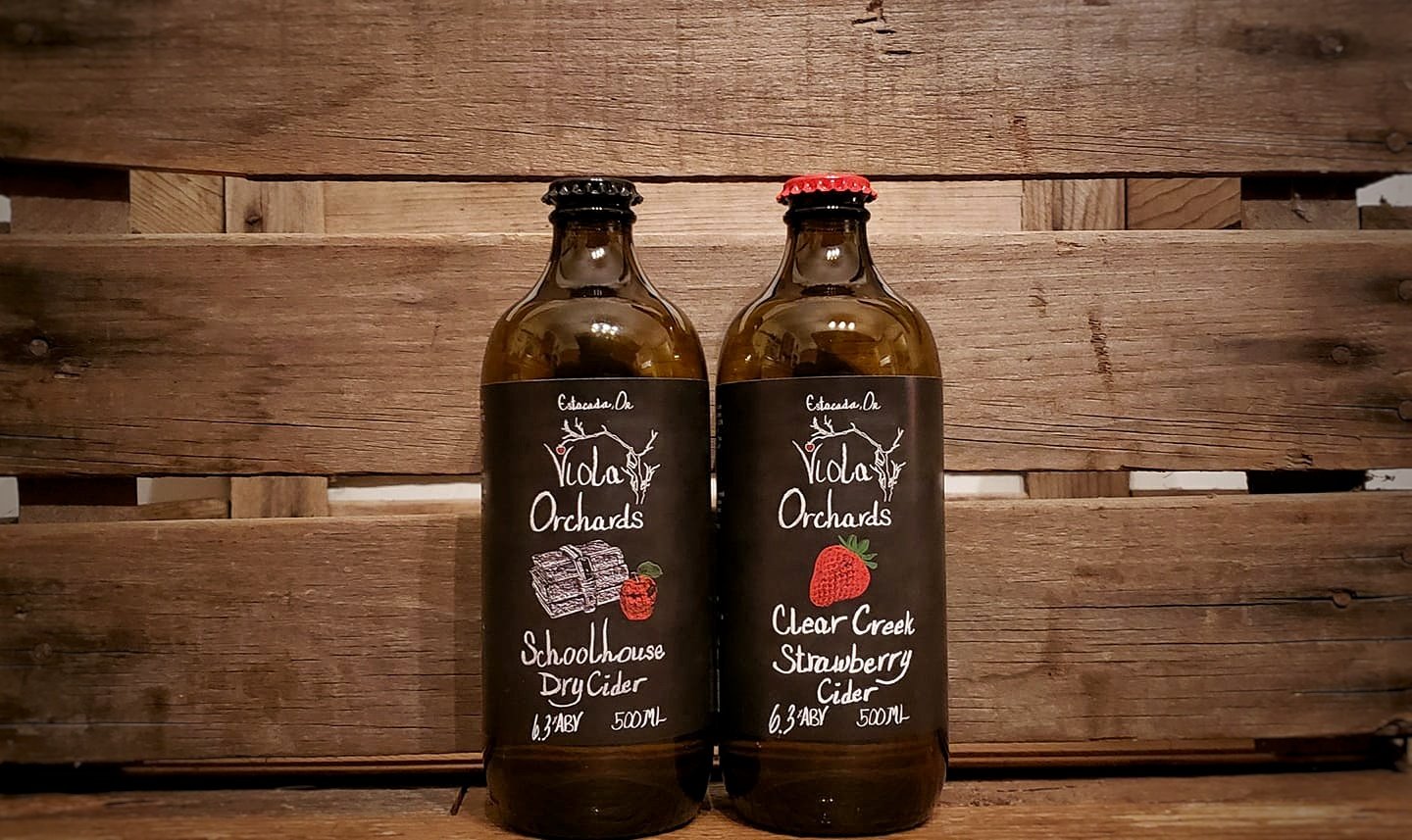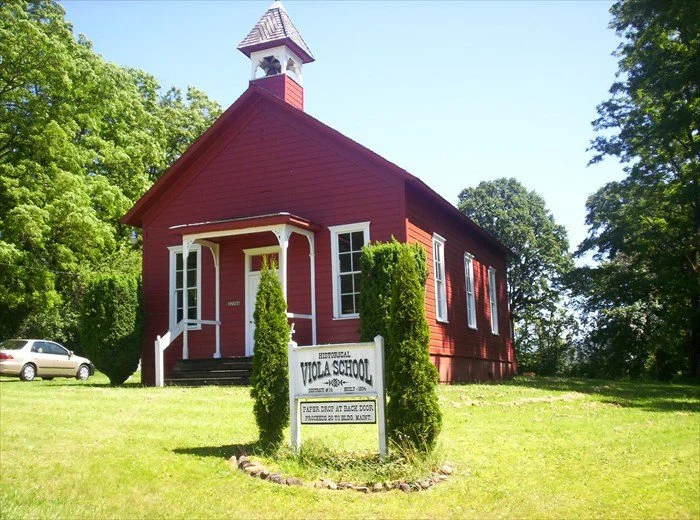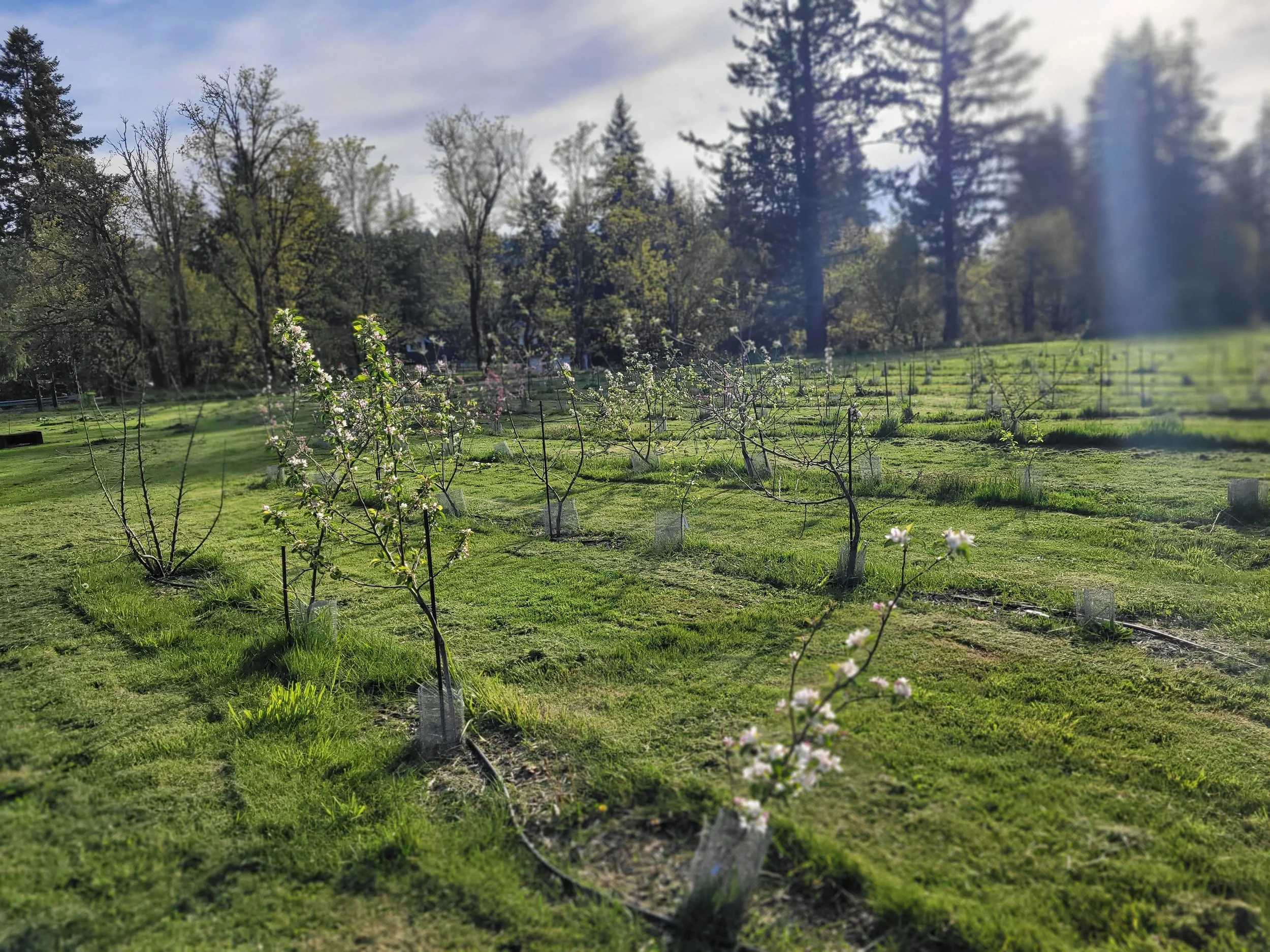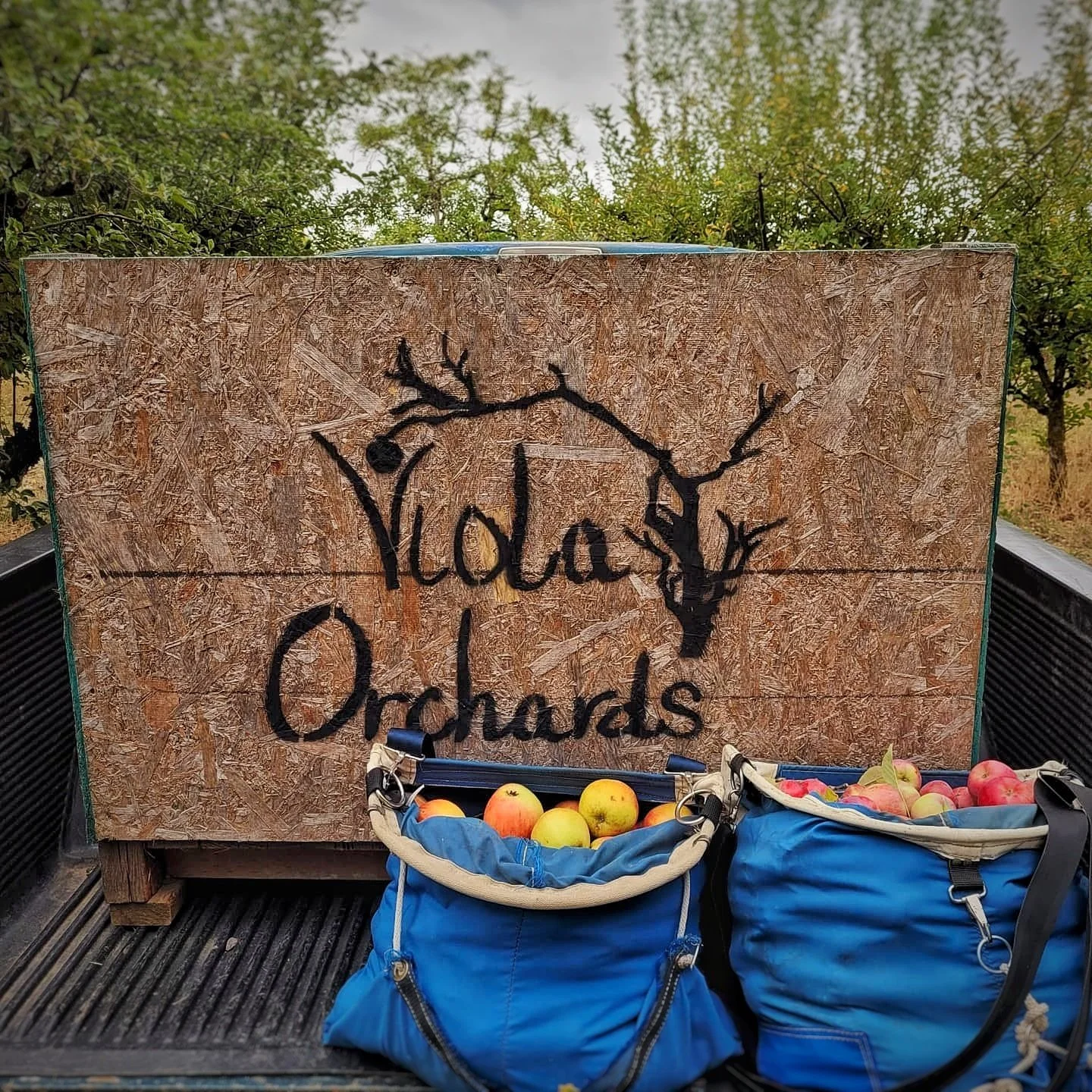Viola Orchards Cider blossoms in Estacada
If you find yourself out in Estacada, you might pass the Viola Schoolhouse, now known as the Viola Community Club, a charming (yes, it’s red) schoolhouse built in 1894. The town of Viola has an agricultural legacy and still has many small farms that dot the land (now just considered Estacada).
Viola Schoolhouse
Across the street from the schoolhouse is one of those farms that caught the eye of Viola Orchards’ owners Brian and Lavina Howard when they were looking for a home and land to plant apple trees, grow orchards, and produce cider from those orchards.
And though their farm is only four acres, the couple is doing what they call high-density planting. At the rate they’re going, they should end up with an impressive 850 trees per acre.
Growing their own variety of apples on their own farm and selling their cider across the Portland metro is just one part of their journey. The couple spent, they say, around a decade doing research and development and officially started their business in 2019, then started selling ciders in 2020.
Lavina and Brian Howard of Viola Orchards
The beginnings
Brian grew up amongst orchards in Western New York while Lavina grew up on her family’s 80 acres in Douglas County. Years ago, Brian attended a backyard apple pressing, helped out, bought some cider, and was hooked.
“The following year, Lavina and I met, and it turned out that her folks owned a bunch of land, and they had some existing apple orchards on their property. So, we started picking there,” Brian says. “I built a press and brought it down there and we would just press in the orchard and then drive all the juice back.” (Nowadays, they use a larger press that Brian built last year, but still use the original press when needed.)
“The first year in the summer of 2011, we picked at the existing orchards at my parents,” says Lavina. “One particular year we ended up at the side of Highway 38 where wild apple trees were growing, picking apple trees and going to one of my dad’s friend's neighbors’ houses and asking if we could pick their apples. Back then we would just get what we could find and press it,” she says.
Searching for land
At a certain point in most relationships, there’s talk of the future, like buying a house. Their initial plan was to buy a home, live in it as an investment, then buy some property to start planting an orchard and open a facility. When they looked at what they could afford to buy in the neighborhoods they wanted to live in, they realized that for just a little bit more, they could start their dream sooner, keep their day jobs (yes, they both have day jobs) with the goal of an orchard to grow to full production.
“We realized that the proximity to Portland and all of the things that were familiar to us was ideal, so that was where the shift happened, and we just ended up being able to get this space and not having to look any further. We got really lucky with the land we found.”
The land—and the existing home on it—was perfect for their orchard—mainly grass and a few existing apple trees. They did soil tests and the soil was ready for apples and didn’t have to be amended.
A year or two before they purchased the property Brian was grafting trees at Lavina’s father's farm, so with the land ready to plant on, trees could be planted quickly when they purchased the land. And with a high water table, they don’t have to water as much, plus Clear Creek runs down the side of the property, providing fantastic soil.
Their orchards are still young and don’t produce all the fruit they need so they still use fresh fruit from other local farms, either picked at a privately owned orchard in Donald or using apples they purchase from other local orchards.
After grafting their trees, they'll go into a nursery for the year, just to make sure that they're grafted and healthy. “We want to get them as strong as possible, and then the following year, those trees go in the ground, and then we graft another round of trees, “ says Brian. “They’ll start fruiting about two years after that, and they'll be at full production five years from the year that you put them in the ground.”
The flavors and varieties
They graft all the trees in their orchard and currently have more than 1,000 trees, planting at a rate of 400 trees per year. Specifically, rows 1-12 are the test orchard while rows 13 and beyond are in blocks of trees. They have over 120 varieties in the orchard, from Liberty, Northern Spy, Wickson, Hewes Virginia Crab to Rhode Island Greening, Colvice Spice, Cortland, Firecracker, Whitney Crab, and Chenango Strawberry just to name a few.
Viola has three flagship products: Schoolhouse Dry, Clear Creek Strawberry, and American Oak.
Lavina describes Schoolhouse Dry as a cider with a unique tartness. “That unique tartness comes from an apple called the Liberty. The inside is this beautiful white, bright flesh, it’s crisp constantly, and the skin is a little thicker. They hold for a long time, and they have this perfect combination between sweet and tart. And that is the distinctive flavor in the Schoolhouse Dry. Even though it’s one of the 40-plus apples in there, it has the ability to come through,” she says.
Another apple they use to help bring up some of the tartness is the Wickson, which is a crab apple. It’s an extremely sweet apple when you taste it, but it's also really tart at the same time and has a high acidity level.
Their American Oak has a wood nose, dry apple body, and smooth oak finish with a buttery mouthfeel, reminiscent of a Chardonnay. Then they age the dry cider on new white American oak.
Meanwhile, the Clear Creek strawberry is their most popular, with a strong natural strawberry smell. “We use natural strawberries in that cider, which is what gives it that beautiful strawberry nose,” says Lavina.
They also produce seasonal ciders, one using Douglas fir tips by taking the new growth off of a Douglas Fir tree in the orchard and adding it to a dry cider. It sold well and will be back next spring and encouraged them to keep experimenting with different flavors.
Self- distribution
They’re currently at around 20 to 25 different locations across SE Portland and SE Clackamas County, with a mixture of on tap and in bottles, and a display at the Oregon City Farmer's Market throughout the entire year as well as other local farmers markets.
Lavina spends time every week going and meeting people, and introducing them to the cider, dropping off samples with owners of establishments.
”We need to be out amongst the people, getting our cider into other bars and restaurants, grocery stores and bottle shops, doing events like top takeovers and tastings, and then as many markets as we possibly can. The relationships that you build with these customers and these clients are very important, and they're one of those things that really need to be nurtured on a regular basis, which is kind of fun.”
What’s next?
Viola Orchards say they’re projected to have three times the amount of cider that they produced last year, based on current demand. They plan to continue to grow the orchard, as much as they possibly can, and then start to do special events in the next five or so years, so people can come out to see the orchard and see the facility.
“We want to continue to grow in a fashion that allows us to still be able to be as hands-on as possible, and to still be a part of the everyday process, to one day make this our day jobs,” says Lavina.
For more information on Viola Orchards or where to buy their ciders, visit here.







